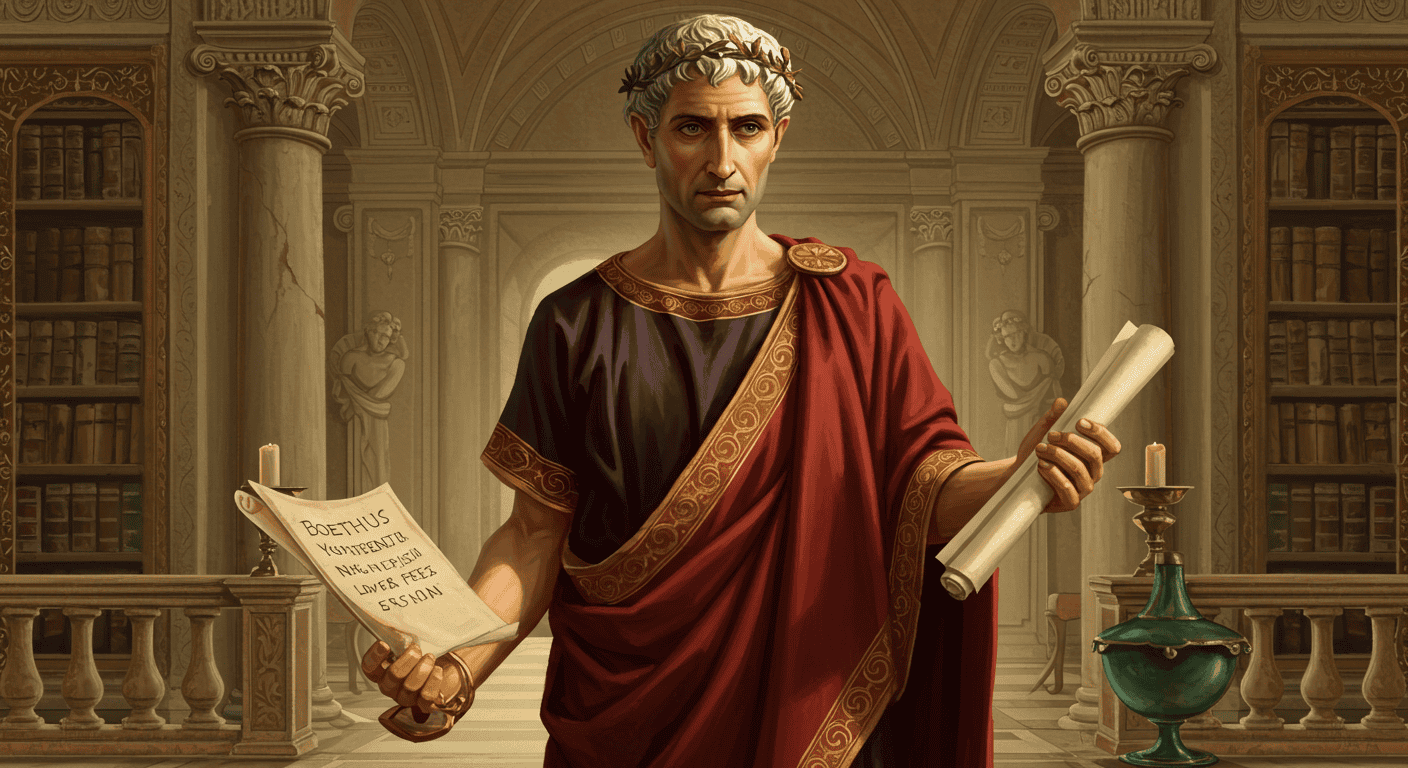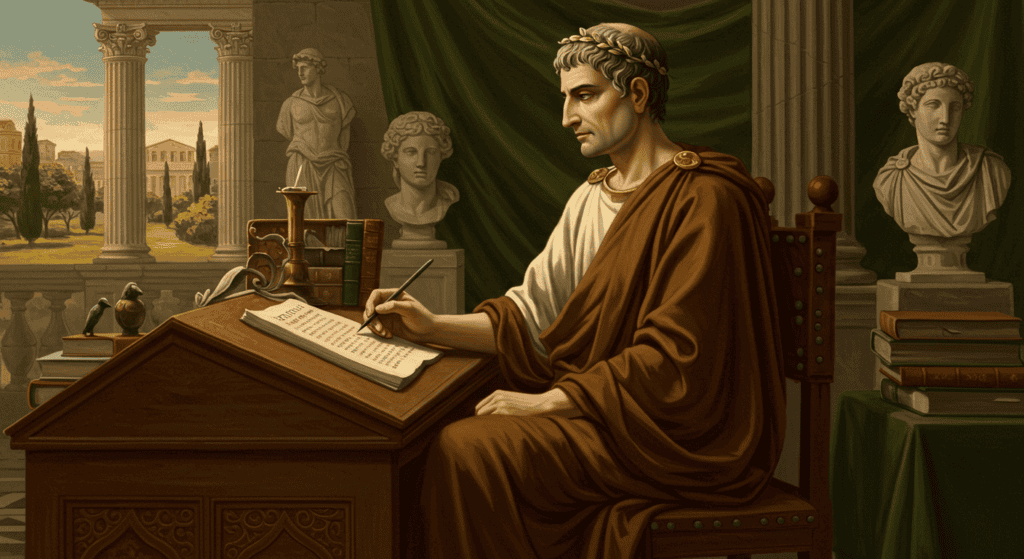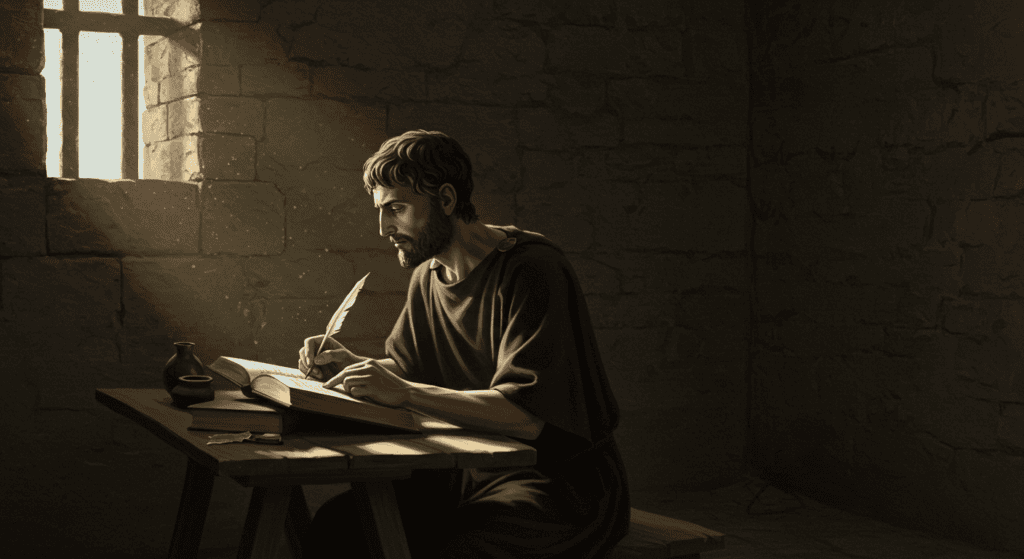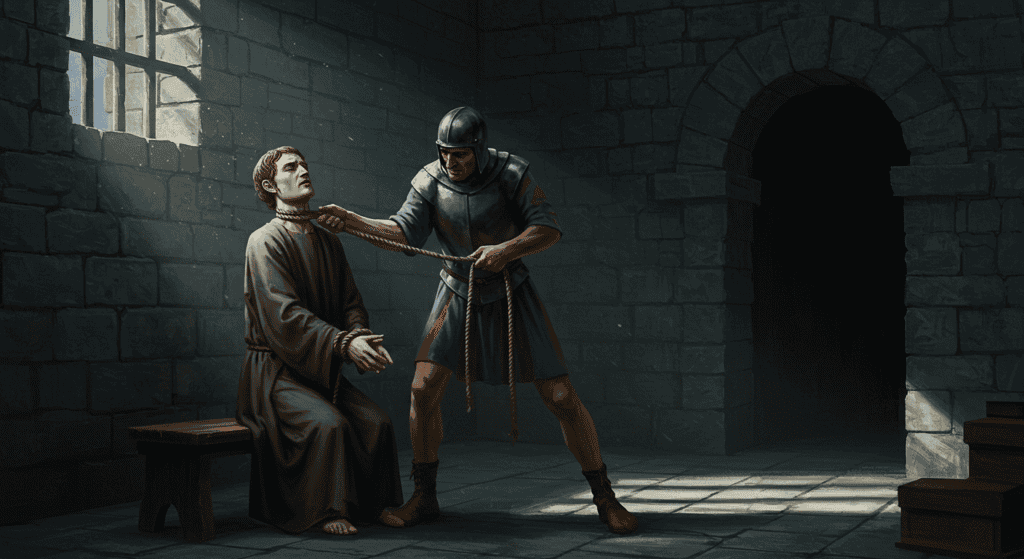
In the twilight of the Roman Empire, as the classical world faded into memory, one man stood as a bridge between antiquity and the emerging medieval era. Anicius Manlius Severinus Boethius, born around 480 CE in Rome, would become known as “the last of the Romans and the first of the Scholastics”. His life and works epitomized the transition from classical learning to medieval thought, leaving an indelible mark on Western philosophy and literature for over a millennium.
A Privileged Upbringing

Boethius was born into a world of fading glory. The Western Roman Empire had fallen just a few years earlier in 476 CE, and Italy was now under the rule of Odoacer. Despite the political turmoil, Boethius enjoyed a privileged upbringing as a member of the ancient and noble Anicii family. Orphaned at a young age, he was adopted by Quintus Aurelius Memmius Symmachus, a noted scholar and aristocrat.
Under Symmachus’s tutelage, Boethius received an education that was becoming increasingly rare in the Western world. He mastered both Latin and Greek, immersing himself in the works of Plato, Aristotle, and other classical philosophers. This comprehensive classical education set Boethius apart from his contemporaries and would shape his future endeavors.
A Scholar in a Changing World
As Boethius came of age, he found himself in a rapidly changing society. The ideal of the Roman aristocrat who lived in a villa and could quote Virgil was fading. Military prowess and religious devotion were becoming the new markers of prestige. Yet Boethius clung to the classical ideal, devoting himself to scholarship and civic duty.
Recognizing the decline of Greek knowledge in the West, Boethius embarked on an ambitious project to translate and preserve the works of classical authors. He set out to translate all of Plato and Aristotle into Latin, hoping to demonstrate the essential agreement between these two philosophical giants. Though this grand project would remain unfinished, Boethius’s translations and commentaries on logic, mathematics, and music theory would become foundational texts for medieval scholars.
Rise to Power
Despite his scholarly inclinations, Boethius was not content to remain in his study. He entered public life, rising quickly through the ranks of the Ostrogothic kingdom that now ruled Italy. By the age of 25, he had become a senator, and at 33, he was appointed consul. His intellect and administrative skills caught the eye of King Theodoric, who made Boethius his chief minister or magister officiorum.
For a time, it seemed that Boethius had achieved a perfect balance between his intellectual pursuits and his civic duties. He used his position to promote classical learning and to mediate between the Ostrogothic rulers and the Roman aristocracy. However, this delicate balance would not last.
The Fall from Grace
In the 520s, tensions began to rise between the Ostrogothic kingdom and the Eastern Roman Empire in Constantinople. Theodoric, once an ally of the Eastern Empire, grew increasingly paranoid about potential conspiracies. Boethius, with his connections to the Roman aristocracy and his efforts to improve relations with Constantinople, became a target of suspicion.
The exact details of Boethius’s downfall remain controversial, but in 523 CE, he was accused of treason. Some sources suggest that he defended a fellow senator against false charges, while others hint at deeper political intrigues. Regardless of the specifics, Boethius found himself stripped of his positions and imprisoned in Pavia, awaiting execution.
The Consolation of Philosophy

It was in this dark hour, facing death and disgrace, that Boethius produced his masterpiece: “The Consolation of Philosophy”. Written in a combination of prose and verse known as Menippean satire, this work is a dialogue between Boethius and Lady Philosophy, who appears to him in his cell.
The “Consolation” is a profound meditation on the nature of happiness, fate, and free will. Through his conversations with Lady Philosophy, Boethius grapples with the injustice of his situation and seeks to understand the workings of fortune and divine providence. The work is remarkable not only for its philosophical depth but also for its literary artistry, blending classical allusions with Christian themes.
In the “Consolation,” Boethius argues that true happiness comes not from worldly success or material wealth, but from the pursuit of wisdom and virtue. He explores the idea that evil is ultimately powerless and that apparent misfortunes can be part of a larger divine plan. These ideas would resonate deeply with medieval readers, making the “Consolation” one of the most influential books of the Middle Ages, second only to the Bible in popularity.
Legacy and Influence

Boethius was executed around 524 CE, likely by strangulation followed by a blow to the head. His father-in-law Symmachus soon met a similar fate. Boethius’ wealth was also confiscated, and his wife, Rusticiana, reduced to poverty. Yet Boethius’s influence was barely beginning.
For over a thousand years, Boethius’s works shaped the intellectual landscape of Europe. His translations and commentaries on Aristotle’s logic became standard textbooks in medieval universities. His treatises on music theory and arithmetic were foundational texts for the quadrivium, the upper division of the seven liberal arts.
The “Consolation of Philosophy” was particularly influential. It was translated into many vernacular languages, including Old English by King Alfred the Great. While Dante, Chaucer, and countless other medieval and Renaissance writers drew inspiration from Boethius’s work.
Boethius’s efforts to reconcile classical philosophy with Christian theology paved the way for the Scholastic movement of the High Middle Ages. His approach to philosophical questions, combining logical rigor with literary elegance, would be emulated by generations of thinkers.
A Bridge Between Worlds
Boethius stands as a unique figure in Western intellectual history. He was, in many ways, the last representative of classical Roman culture. His education, his literary style, and his devotion to Greek philosophy all harken back to an earlier age. Yet he was also a harbinger of the medieval world to come, with his Christian faith and his efforts to preserve and transmit ancient learning.
In his life and works, we see the complex interplay between continuity and change that characterized the transition from antiquity to the Middle Ages. Boethius’s tragedy was that he lived in a world that was no longer able to fully appreciate his classical learning. Yet it was precisely this mismatch between his ideals and his reality that produced his greatest work and ensured his lasting influence.
In the end, Boethius achieved a kind of immortality that even he might not have imagined. Though his life was cut short, his words have echoed through the centuries, inspiring and consoling generations of readers. As the last light of classical Rome, Boethius illuminated the path forward into the medieval world and beyond, leaving a legacy that continues to enrich our understanding of philosophy, literature, and the human condition.




